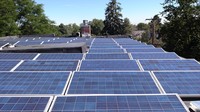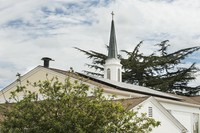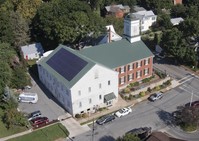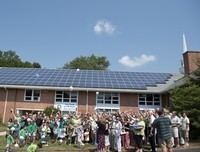Solar
In the heavens, the Holy One has set a tent for the sun, which…like a strong man runs its course with joy. (Psalm 19:4-5)
As the realities of climate change present an ever increasing urgency to our need to act faithfully in our energy consumption, many Presbyterians are exploring ways to support, purchase, and share renewable energy resources as an alternative to fossil fuel energy. From Presbyterian congregations drawing interest from the passers-by that notice solar panels on their rooftops, to a Presbyterian teen purchasing solar panels to charge his electric lawnmower (part of his carbon-neutral lawn-care service), the time is ripe to explore the options of solar energy as part of our Christian discipleship.
March 2016 Webinar "Presbyterian Churches & Solar Energy Webinar"
Five PC(USA) congregations shared stories and photos of their solar panels at church, including how they made the decision to invest in solar, how they financed their project, what benefits they’ve experienced, and what other energy efficiency measures they completed.
Flagstaff Federated Community Church, Flagstaff AZ - Solar Energy
First Presbyterian Church, Jeffersonville, IN - Solar Energy
Shepherdstown Presbyterian Church (WV) powerpoint
Capitol Heights Presbyterian Church (CO) powerpoint
Limestone Presbyterian Church (DE) powerpoint
Solar Churches
Factors to Consider
- Energy Efficiency: Optimize your physical plant BEFORE considering solar. Decreasing energy demand means a smaller, less costly solar array.
- Faith: God’s covenant extends to all creation and we are called to love our neighbors and care for “the least of these.” Discuss in your church how and if solar power may be a faithful response to God’s call?
- Finances: Research options for your location, such as capital campaign/budget, state/presbytery or Presbyterian Investment and Loan Program Restoring Creation loans (new brochure introducting loan), leasing, crowdsourcing, renewable energy credits, or other.
- Hardware: Decide size of array (kWh, number of panels, percentage of energy demand covered); aesthetics (some churches want it hidden, some want to show it off!); who will install (a contractor or church volunteers).
- Evangelism: Some churches have found that solar panels attract young adults and families to their congregation because they are a visible and intriguing witness of Christian discipleship. Visibility of ministry and increased membership may be unexpected outcomes of going solar.
Click here to read White House Actions for Renewable Energy (August 2015)
Article includes these interesting facts on solar: "Last year, the United States brought online as much solar energy every three weeks as it did in all of 2008, and the solar industry added jobs 10 times faster than the rest of the economy. Since the beginning of 2010, the average cost of a solar electric system has dropped by 50 percent. In fact, distributed solar prices fell 10 to 20 percent in 2014 alone and currently 44 states have pricing structures that encourage increased penetration of distributed energy resources."
Congregational Stories and Funding
Read a few stories about churches who have solar and other earth care ministry.
Most recent (November 2015) story about solar at First Presbyterian Church of Jeffersonville IN.
Other solar church stories include:

Capitol Heights Presbyterian Church (Denver, CO)
25 kW array provides 60% of demand; upfront cost was $500 with a monthly lease of $100; 25 year lease, then purchase array for $1.00! (Note: not all states have leasing options.)

Trinity Presbyterian Church (Santa Cruz, CA)
10 kW array; 40 panels provides 98% of electrical need. Acquired10-year $38,000 loan from the Synod of the Pacific, 3.5% interest, payment roughly equal to previous electrical utility bill!

Shepherdstown Presbyterian Church (WV)
85 households participated in crowdsource fundraising, through a water heater project. The church paid $1 for the system: 16 kW, 60 panel system, covers 45% of the electrical needs.
 Limestone Presbyterian Church (Wilmington, DE)
Limestone Presbyterian Church (Wilmington, DE)
In 2008, Limestone installed 180 panels, annually producing 58 MW of power, eliminating 90,000 lbs of CO2 and other pollutants, covering 2/3 of the church energy costs (saving $6,500 in energy costs annually) and producing additional income through Renewable Energy Credits (REC). Many people who have joined the church recently said they were attracted initially because of the solar panels. The solar project cost $250,000 with a state grant paying for half of it and with a loan from Presbyterian Investment & Loan Program that will be paid for within a decade. The costs of solar panels are 2/3 less today and solar panels are now guaranteed for 25 years.
Congregations have funded their solar projects (after completing energy conservation measures) through various means: regular church budget, capital campaign, a grant, loan, lease, or by crowd-sourcing. Each state and each congregation differs in what is available. Grants are quite rare but some churches have been blessed to receive one.
Crowd-sourcing:
For Shepherdstown Presbyterian Church's solar project, there was a creative crowd-sourcing kind of funding opportunity. A company in West Virginia installed remote-controlled, peak energy regulators on consumers’ electric water heaters. The heaters are turned off for short periods (< 5 minutes) during peak energy demand. This reduces the electrical utility’s need for backup power generators. Homeowners receive $100/year which they donate to the cost of the solar project. There is no cost for homeowners and no noticeable effect on hot water supply.
Loans:
Contact Presbyterian Investment and Loan program to consider their new green loans!
You may also check presbytery, synod, or community resources in your area.
Leasing (also called third-party financing):
For a state map and more detailed explanations about states that allow third-party ownership, go to http://apps3.eere.energy.gov/greenpower/onsite/solar_financing.shtml)
NOTE! Only available in some states!
Two models.
- Customer signs a traditional lease and pays for the use of the solar system.
- Customer signs a power purchase agreements (PPA) to pay a specific rate for the electricity that is generated each month.
Motives of third party investor:
- Obtain the 30% federal tax credit (expires 1/1/17 but may be extended. A church as a nonprofit is not eligible for any tax credit.)
- Write off the depreciation of the system.
NOTE: Anyone (including church members can form an LLC and become the third party investor).
Motives of church (in addition to environmental motive):
- No installation costs.
- At end of lease period, choose to either: a. buy the system at the depreciated value (or less); b. remove the system (and install a more modern one).
NOTE: with decline of local rebates and other incentives, third party leases have become most popular funding mechanism in eligible states (a year ago >75% in Arizona, California, and Colorado)
Solar Financing Guide available from Interfaith Power and Light.
Presbyterians Willing to Answer Your Church's Questions
Contact Environmental Ministries to be connected with one of the churches listed here, to learn more about their solar panels, how they financed it, and what they've experienced as a church, as a result.
The churches and church organizations listed below all have solar arrays. Each church has a contact person willing to answer some questions about solar power, if you contact Environmental Ministries for their information. Their funding mechanism(s) are identified by the code: B, Budget; Cc, capital campaign; Gr, grant; Lo, loan; Le, lease; CS, crowdsource.
Capitol Heights Presbyterian Church, Denver, CO: Le
First Presbyterian Church, Tallahassee, FL: Cc
Flagstaff Federated Church, Flagstaff, NM: Lo
Limestone Presbyterian Church, Wilmington, DE: Lo
North Presbyterian Church, Williamsville, NY: Le
Presbyterian Church of the Apostles, Burnsville, MN: Cc
Second Presbyterian Church, Kansas City, MO: Le
Shepherdstown Presbyterian Church, WV: Cs
Trinity Presbyterian Church, Santa Cruz, CA: Lo
Westminster Presbyterian Church, Knoxville TN: B, Gr
Church organizations with solar panels
Ferncliff Camp and Conference Center
San Francisco Theological Seminary
Synod of the Sun
Energy use
Learn more
- April 2015 Presbyterian Energy Tithe Challenge webinar and related powerpoints now available (scroll down to April 2015 for multiple links to download and use powerpoint presentations). Take this challenge to sign up for EPA Portfolio Manager, to save atleast 10% on your utility bills or energy use, and save money for your church's mission!
- View a powerpoint that was the basis for a December 2013 webinar with EPA ENERGY STAR for Congregations staff person Jerry Lawson, as well as two PCUSA Earth Care Congregation representatives who have worked with the EPA Portfolio manager tool: click here for the pdf.
- Visit the Energy Star for Congregations Web site and get a guide for obtaining an energy audit for your church and steps on how to make your church more energy efficient.
- Web of Creation offers many resources on faith and ecology; including “The Environmental Guide for Congregations, Their Buildings, and Grounds,” a holistic look at how congregations impact the environment with steps to reduce this impact.
- Visit the Regeneration Project and Interfaith Power and Light Web site and get a wealth of resources on energy efficiency issues.
Take action
-
Calculate your household carbon footprint and learn steps to lessen the impact on this EPA web site.
- Some utility companies offer free home energy audits. Contact your utility company today to see if this applies in your area.
- Learn more about how to perform an energy audit of your church through PC(USA)’s Electric Stewardship Program.
- Find a “Do It Yourself” energy audit from Kansas Interfaith Power and Light to calculate the carbon footprint of your church.
Theological reflection
- Creation Justice Ministries (formerly the National Council of Churches Eco-Justice Program) has many theological and worship resources on climate and energy here.
Connect to Others
If you're interested in solar, you may also want to learn more about:
- Certified PC(USA) Earth Care Congregations (many working on solar, energy efficiency, and more)
- Eco-Palms
- Presbyterian Coffee Project
- Fair Trade
- Food and Faith
- International and National Development-- specifically Joining Hands round-table on climate change and extractives! (If you are an individual passionate about fighting systemic causes of poverty, there’s a place for you around the table. Contact valery.nodem@pcusa.org for more information on joining the extractives campaign table.)
All available through Presbyterian Hunger Program at: www.pcusa.org/hunger

